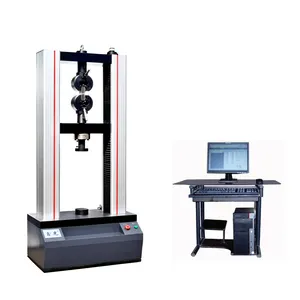Introduction to Electronic Type Tensile Testing Machine
The electronic type tensile testing machine serves as a vital instrument in material science, engineering, and manufacturing industries. This sophisticated device is engineered to measure the tensile strength, yield strength, and elongation of materials, providing critical data essential for quality control, product development, and failure analysis. By facilitating precise measurements, it ensures that materials can withstand applied forces without breaking, thus guaranteeing safety and durability in various applications.
Types of Electronic Type Tensile Testing Machines
Electronic type tensile testing machines are available in various models, each designed to meet specific material testing requirements. The primary types include:
- Universal Testing Machines (UTMs): Versatile machines capable of performing tension, compression, and bending tests.
- Micro and Nano Tensile Testing Machines: Designed for testing very small specimens with high precision, ideal for research applications.
- Hydraulic Tensile Testing Machines: Feature hydraulic components for high-capacity testing, suitable for heavy materials.
- Electric Servo-Controlled Machines: Provide advanced control and high-speed testing capabilities, perfect for dynamic applications.
Applications of Electronic Type Tensile Testing Machines
The electronic type tensile testing machine is utilized across a wide range of industries, each with specific material requirements:
- Construction Materials: Assessing the strength of steel, concrete, and other building materials to ensure structural integrity.
- Aerospace Engineering: Testing lightweight and composite materials for aircraft to ensure safety and reliability.
- Automotive Industry: Evaluating metals and plastics used in vehicle components for durability and performance.
- Textiles: Determining the tensile properties of fabrics and fibers to ensure quality in fashion and textiles.
Features and Advantages of Electronic Type Tensile Testing Machines
Key features inherent to electronic type tensile testing machines contribute to their effectiveness in material testing:
- High Precision Sensors: Provide accurate measurements that enhance the reliability of test results.
- Digital Display and Analysis Software: Facilitates easy monitoring of tests and simplifies data analysis and reporting.
- Operational Versatility: Able to test various materials, from metals to plastics, with adjustable speed and load settings.
- Data Acquisition System: Enables real-time data collection and storage for extensive analysis and documentation.
The advantages of using an electronic type tensile testing machine include:
- Improved Test Accuracy: Consistent and accurate results reduce the risk of production defects.
- Enhanced User Safety: Equipped with safety features that minimize the risk of accidents during operation.
- Cost-Effectiveness: Allows for in-house testing, reducing the need for external laboratories, thus saving time and costs.
- Ease of Maintenance: Designed for straightforward calibration and upkeep, ensuring long-term reliability.




















































